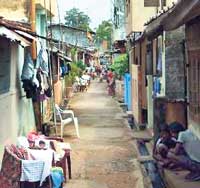
Kirulapura slums |
|
W.G. Indrani and 10 members of her extended-family, 2 dogs and 4 cats live in a house built on two perches of land. Mercifully their baker’s dozen budgie birds have their own cage in the alleyway in front of the house.
Indrani’s house is one of 570 houses crowded almost one-on-top-of-the-other, in the slum settlement of Kirulapura, located in Kirulapone near the heart of Colombo city. Every inch of the houses and the alleys are alive with flies and intermittent scatterings of cats, dogs, garbage and children. The smell of urine and garbage cuts through walls.
Ms Indrani represents a community grouping in Kirulapura that is asking for bank loans to expand their homes. “We have applied for loans to upgrade our houses. There is no room in the watta (settlement) to expand our houses, although in some cases 4, 5 families live in one house. So we will put a concrete slab on the roof and expand our houses upwards,” says Ms Indrani, Treasurer of ‘Ekamuthu A’ Association of Kirulapura.
The settlers here, many without proper deeds to their lands and houses, do not want to shift elsewhere, even in exchange for bigger plots of land and better quality of health and sanitation. “Why should we move from here? We have been here from our parents time, from 1972. There are no jobs elsewhere. This is a good place,” she says.
This is quite true. The slums occupy prime plots of commercial land in Colombo city and the settlers know they are sitting on a gold mine. Also, there is always casual work, legal and not-so legal, to be found in the city. As a result, although they are described as ‘low income’ households, many slum dwellers in Colombo are actually cash rich.
“People here earn about Rs 35,000 per month. Some earn more because there is plenty of labourer work in addition to any other regular jobs they do,” says Ms Indrani who herself operates a gas delivery business. All the houses also benefit from electricity and water and have TVs, fans and radios going at full blast.
However, despite the good cash flows, until now, getting bank loans have been difficult for people in Kirulapura. This is because banks have a problem with their postal address and also don’t trust their ability to provide collateral and repay loans.
Loan guarantees
Now however, families in Kirulapura can access bank loans through a new UN Habitat and government funded project, to upgrade housing facilities in slum settlements.
Under the project, UN Habitat has given a grant of US$ 1.4 million to set up a National Guarantee Fund. The Fund is expected to encourage banks to give loans to families in low income settlements. A new institution called the Lanka Financial Services for Under Served Settlements (LFSUS), a public-private partnership, has also been set up to facilitate the process.
“LFSUS, on behalf of low income settlers and project partners, issues a guarantee to commercial banks, for their settlement upgrading projects. The aim is to make families in slum settlements ‘bankable,’” says the Country Coordinator of the Slum Upgrading Project, UN Habitat, Ayanthi Gurusingha.
As a pilot programme, 31 families in two slum settlements including Kirulapura, have been selected to get bank loans to upgrade their homes. HSBC bank has agreed to provide up to Rs 10 million in loans, through the South Asia Partnership Sri Lanka (SAPSRI), a non governmental organisation. The bank loans are provided at commercial rates.
“We will provide loans up to a maximum of Rs 300,000, for housing upgrading, at 24% annual interest, over 3 years,” said the Executive Director of SAPSRI, Dr Padma Ratnayake. SAPSRI already has experience working with families in slum settlements and says that such loans, provided mainly to women, have high repayment rates.
Growing problem
Sri Lanka’s urban poverty is a growing problem due to expanding populations and increasing migrations into urban centres. At this point, UN Habitat estimates 65,000 slum dwellers in Colombo city alone, in 1,507 slum settlements. Other large cities like Kandy, Gampaha and Kalutara are also seeing their urban poor populations expanding. However, UN Habitat says this is a problem common to many countries as a result of rapid urbanisation.
“The increase in urban poor is one of the most crucial political issues of this century. The UN Habitat Slum Upgrading Facility was established to examine innovative financing mechanisms to help address this problem,” said the Senior Advisor of the Slum Upgrading Facility, UN Habitat, Michael Mutter.
UN Habitat is hoping to expand its current pilot programme in Sri Lanka to target around 60% of the slums in the country, in the future.
|

